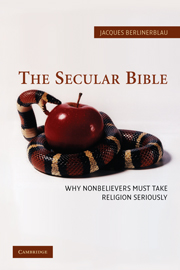Book contents
- Frontmatter
- Contents
- Preface and Acknowledgments
- Introduction: Secularists and the Not Godless World
- PART ONE THE COMPOSITION OF THE HEBREW BIBLE
- PART TWO THE INTERPRETERS OF THE HEBREW BIBLE
- PART THREE POLITICS AND SCRIPTURE
- Conclusion: Beyond Church and State: New Directions for Secularism
- Notes
- Index of Biblical Citations
- Index of Qur'ānic Citations
- Index of Rabbinic, Early Jewish, and Patristic Citations
- Index
Preface and Acknowledgments
Published online by Cambridge University Press: 05 June 2012
- Frontmatter
- Contents
- Preface and Acknowledgments
- Introduction: Secularists and the Not Godless World
- PART ONE THE COMPOSITION OF THE HEBREW BIBLE
- PART TWO THE INTERPRETERS OF THE HEBREW BIBLE
- PART THREE POLITICS AND SCRIPTURE
- Conclusion: Beyond Church and State: New Directions for Secularism
- Notes
- Index of Biblical Citations
- Index of Qur'ānic Citations
- Index of Rabbinic, Early Jewish, and Patristic Citations
- Index
Summary
The reader is forewarned that I have employed the “we” form throughout the main body of this work. By doing so I do not mean to imply that the ideas expressed here represent the unified position of a group of scholars. Nor do I want to suggest that my ideas are so overpoweringly persuasive that my audience has been won over, absorbed submissively into the empire of the present author's fictitious “us.” What follows are, ostensibly, my own ideas and I fully expect (and hope) that my readers will disagree with many of them. But a sense of modesty compelled even this secularist to avoid the constant insertion of “I” into sentences whose subject was God, the Holy Spirit, Moses, Origen, Ibn Ezra, and so on. Aside from the artlessness of it all, is there not something a tad narcissistic about constantly calling attention to the self when discussing such figures?
In today's academy it is everywhere assumed (but nowhere, to the best of my knowledge, persuasively argued) that the use of “I” in scholarly writing represents something of a rhetorical/ideological breakthrough. Viewed as an improvement upon the imperious, duplicitous “we” of yesteryear, the new usage has become the industry standard. Well, a few decades into the regime of the “I” perhaps it is time to take stock. Has recourse to the first-person singular significantly increased the ability of scholars to discover new ideas? Has the quality of our research improved now that the author speaks directly to the audience?
- Type
- Chapter
- Information
- The Secular BibleWhy Nonbelievers Must Take Religion Seriously, pp. xi - xivPublisher: Cambridge University PressPrint publication year: 2005



